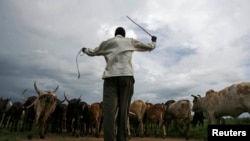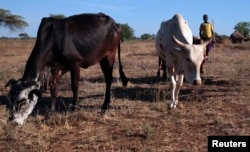Africa's nomadic cattle herders have for years come under pressure from governments and farmers to settle down and stop their livestock roaming, destroying crops and creating conflict along the way.
While herders are often portrayed as straying onto farmland, it is farmers who first encroached onto the nomads' grazing land, said Benjamin Mutambukah, coordinator of the Coalition of Pastoralist Civil Society Organizations (COPACSO) and a passionate advocate of the herders in Uganda.
"When you talk about the drylands of Africa, who has been the occupant of those areas right from the word go? It was the pastoralists and the wildlife," he said.
The pastoralists' ancient skills in land management should be respected, and their needs recognized to avert conflict between nomads and farmers, he said.
Crop farmers who have "failed to control" their own population growth have spread into pastoralist areas and then expected the nomads to stop moving across the land, he said.
"If you went to Iceland, and you tried to tell the people of Iceland not to do fishing, I don't think you'd be very welcome," he said on the sidelines of an annual meeting of the Committee on World Food Security, a U.N. body which brings together governments and food experts to discuss global food security.
"Another unfortunate thing is, when these people come — including governments — they look for the wettest parts of the dry lands which the pastoralists have traditionally reserved for dry season grazing," he told the Thomson Reuters Foundation.
In Uganda, nomads travel across the country's dry lands called the cattle corridor, which run from the southwest, across the center and up to the northeast.
Using very few resources, they produce most of the beef and much of the milk consumed in Uganda, Mutambukah said.
"You hear people saying that pastoralists are just roaming. I tell them people who are just roaming would have died long ago," he said.
Uganda's northeast Karamoja region, once synonymous with cattle rustling and clan violence, is one of the poorest in the country. Kenyan herders bringing cattle across the border have increased pressure on scarce resources.
Tensions have been eased by tribal elders meeting to decide how many heads of cattle can enter Uganda and when.
Since colonial times nomadic areas have been neglected across Africa, and many still have poor roads, education and health services, Mutambukah said.
"That puts them in a situation whereby they question the whole essence of being part of the state. So long as we don't solve the problem of people being — or thinking — they are marginalized, it becomes difficult to end [conflict]," he said.






